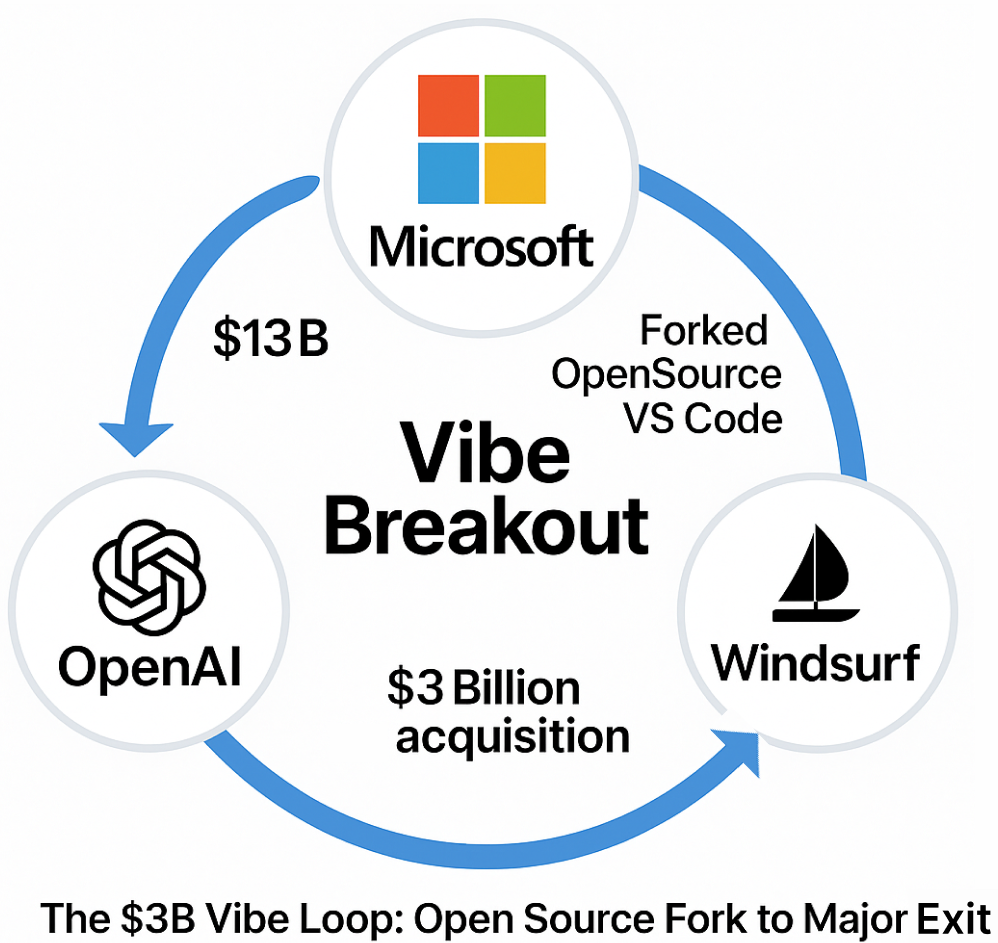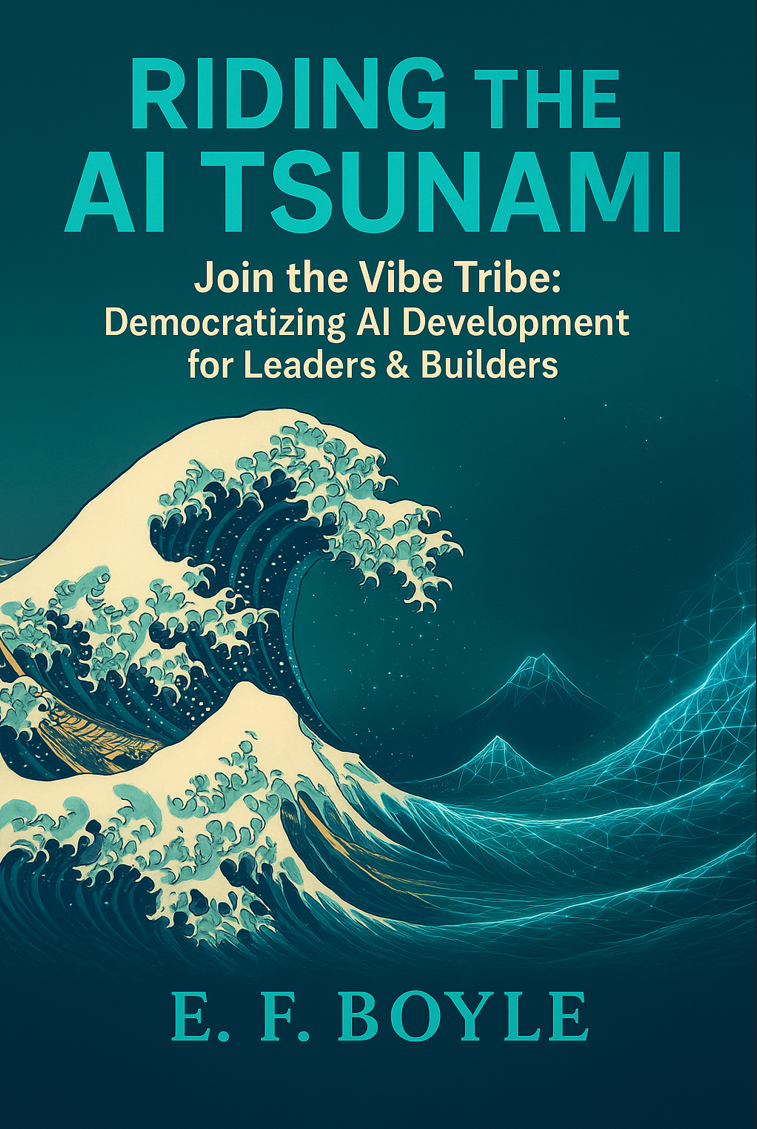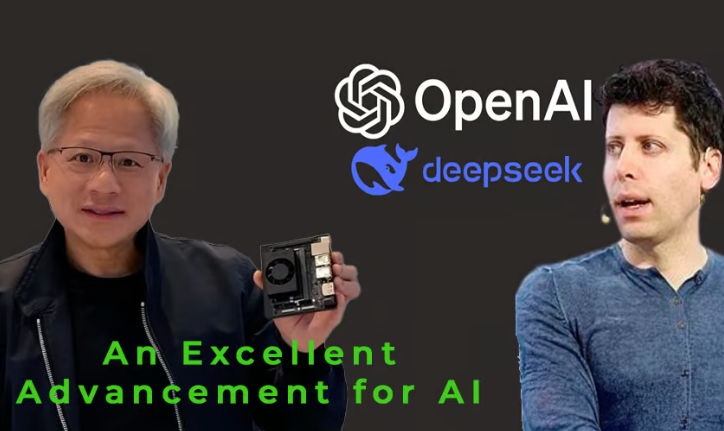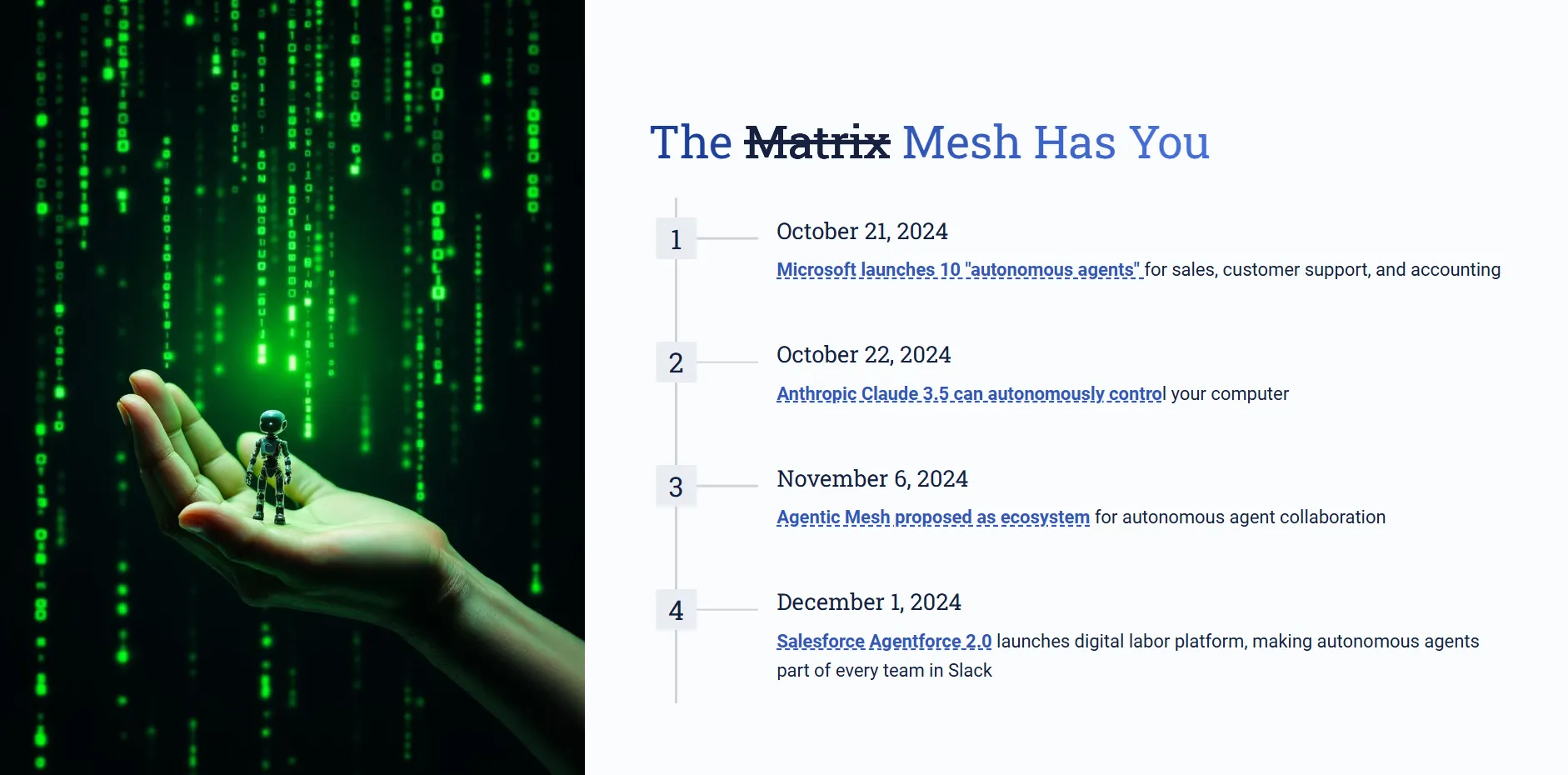GenAI 2.0: OpenAI's $3B Windsurf Deal Signals a Major Inflection
OpenAI's $3B purchase of Windsurf's Vibe Coding platform echoes Google's pivotal acquisition of YouTube that defined Web 2.0's arrival. Just as YouTube validated user-generated content as the future of the internet, Cursor, Windsurf, et. al. and the Vibe Coding trend could mark the defining moment for GenAI 2.0 - where dev tool makers take center stage from frontier model builders.
The irony? Windsurf began as a fork of Microsoft's open-source VS Code platform... and now OpenAI is using $3B of Microsoft's investment to acquire it! Early investors in all rounds are witnessing remarkable IRRs ranging from 75% to over 200% in just 4.5 years, challenging the traditional belief that developer tools don't yield venture-scale returns.
Like many, I am mesmerized by this Vibe Coding explosion. I am publishing a book in a few weeks, "Riding the AI Tsunami," and launching a newsletter, "The Vibe Tribe," on the topic for both Leaders and Builders. Follow me to stay posted on the release! 🚀
Breaking the Developer Tools Curse
There has been a lot of talk recently around the lack of exits and IPOs extending beyond 13 years from Seed for most startups. The venture capital ecosystem has shifted dramatically since the heady days of 2021, with extended timelines becoming the norm rather than the exception. Occasionally, a company emerges that challenges these established trends. Windsurf is one such outlier, likely to deliver fantastic IRRs in the 75% to 200% range across all four rounds of investors with its rumored $3 billion acquisition by OpenAI.
Historically, Developer Tools was not a fantastic place for Angels to find Unicorns. Slow growth, difficult monetization, and the constant threat of open-source alternatives eroding paid customer bases have long plagued the sector. Traditional VC wisdom cautioned against heavy investments in dev tools, pointing to limited exit opportunities and modest returns compared to consumer or enterprise SaaS plays.
Windsurf's remarkable journey shows that investors cannot blindly follow traditional patterns. Occasionally, the categories deemed "uninvestable" become the source of extraordinary returns.
Windsurf Story: From GPU Optimization to AI Revolution
Windsurf began its journey in 2021 as a GPU-focused startup, raising a modest $3 million seed round led by Greenoaks. The founding team, comprised of former NVIDIA and Google Brain engineers, initially set out to build optimization tools for machine learning workloads running on GPU clusters. Their initial product offering focused on efficiency gains and cost reduction for ML teams struggling with the increasing complexity of training large models.
The company's trajectory changed dramatically when the transformer architecture's future became evident right as they completed their Series A in April 2022. The $25 million round, again led by Greenoaks, came at a pivotal moment in AI development. Just months after closing the round, Windsurf made a critical pivot that would ultimately define its success.
Rather than continuing down the path of pure infrastructure optimization, Windsurf's leadership recognized the transformative potential of large language models for code generation. They refocused their efforts on building an AI-powered coding assistant that leveraged their deep expertise in GPU optimization to deliver faster, more accurate code completions than competitors.
This pivot wasn't without risk. At the time, GitHub Copilot was the dominant player in the space, backed by Microsoft's seemingly limitless resources. Many investors questioned whether a startup could compete effectively in a market with such a formidable incumbent.
The Rise of a Challenger
Windsurf's bet paid off spectacularly. Their product differentiated itself through superior performance, context awareness, and integration capabilities that resonated with professional developers. While GitHub Copilot remained a strong competitor initially, it was eventually Cursor who emerged as Windsurf's primary rival.
Cursor has recently shot up to a $9 billion valuation, tripling their ARR to $300 million in just the last four months. This explosive growth in the developer tools space demonstrates the massive market opportunity that Windsurf recognized early. Windsurf's strategic shift towards AI-powered development tools has perfectly positioned them to capitalize on this significant market opportunity.
The Ironic Full Circle: From VS Code to $3B Acquisition
Perhaps the most delightful irony in the Windsurf story lies in its technical origins. What many don't realize is that Windsurf's foundational technology was built by forking Microsoft's open-source VS Code IDE platform—a tool that Microsoft gives away for free. In a remarkable circular journey, OpenAI is now reportedly using $3 billion of the $13 billion investment provided by Microsoft to acquire the very company that enhanced and monetized Microsoft's free technology.
This irony highlights a fundamental truth in today's technology landscape: small, fast-moving early-stage companies can outperform massive tech giants with vastly greater resources, perhaps even more dramatically now than in the YouTube era. While Microsoft has its AI coding assistant integrated directly into GitHub Copilot, Windsurf's team was able to create differentiated value worth billions by building on Microsoft's own foundation.
Put another way, Microsoft essentially funded its competition by first creating VS Code as an open-source project and then providing capital to OpenAI, which is now acquiring a venture-backed company that leveraged Microsoft's free technology to build a more compelling product.
Echoes of YouTube and Other Transformative Acquisitions
The rumored OpenAI acquisition of Windsurf bears striking parallels to Google's landmark acquisition of YouTube in 2006 for $1.65 billion or about $2.5 billion today. However, what was particularly painful about that deal was that Google had previously passed on acquiring YouTube for approximately half that price around six months earlier, believing they could develop superior technology in-house. However, they engaged in a competitive bidding battle with Yahoo, which likely played a crucial role in shaping the future of both companies. YouTube's value increased so rapidly that the Series A and B investors reportedly achieved internal rates of return (IRRs) of 11,800% and 95,000% on their investments within just 6 to 12 months.
Other notable tech acquisitions that share similarities with the Windsurf situation include:
- GitHub's acquisition by Microsoft (2018) for $7.5 billion—a deal that surprised many given Microsoft's historically antagonistic relationship with open source. This developer tools acquisition has proven transformative for Microsoft's developer strategy, much as Windsurf could reshape OpenAI's position in the developer ecosystem.
- Instagram by Facebook (2012) for $1 billion when Instagram had just 13 employees and no revenue. The deal, once mocked as overpriced, is now considered one of the greatest acquisitions in tech history, with Instagram estimated to be worth over $100 billion today.
- WhatsApp by Facebook (2014) for $19 billion, representing a massive strategic bet to prevent competitors from dominating messaging. The Windsurf acquisition similarly represents a strategic positioning move for OpenAI in the developer tools space.
What these successful acquisitions share is the acquirer's willingness to make bold bets on emerging platforms at inflection points, even when conventional metrics might suggest the price is too high.
Looking Forward: The Future of Developer Productivity
The next wave of developer tools startups will likely focus on even more specialized AI-powered solutions for different programming languages, frameworks, and industries. As the API economy continues to expand and software development becomes increasingly composable, we can expect to see more unicorns emerge from this once-overlooked category.
A Triumph of Vision and Execution
Windsurf's journey from a modest GPU optimization startup to a $3 billion acquisition target in just 4.5 years represents a triumph of vision and execution. The founding team recognized a pivotal moment in technology evolution and had the courage to reorient their entire company around it. Investors across all four funding rounds are now poised to reap the rewards of that foresight.
In a venture landscape often characterized by extended timelines and delayed returns, Windsurf stands as a powerful counterexample—proof that extraordinary outcomes are still possible for companies that identify the right market inflection points and execute with precision. For founders and investors alike, it's a reminder that conventional wisdom should always be questioned, especially at moments of technological transformation.
As the developer tools category continues its renaissance, Windsurf's success will likely inspire a new generation of founders to tackle problems once deemed too niche or challenging to build venture-scale businesses around. In venture capital, today's exceptions often become tomorrow's playbook.





